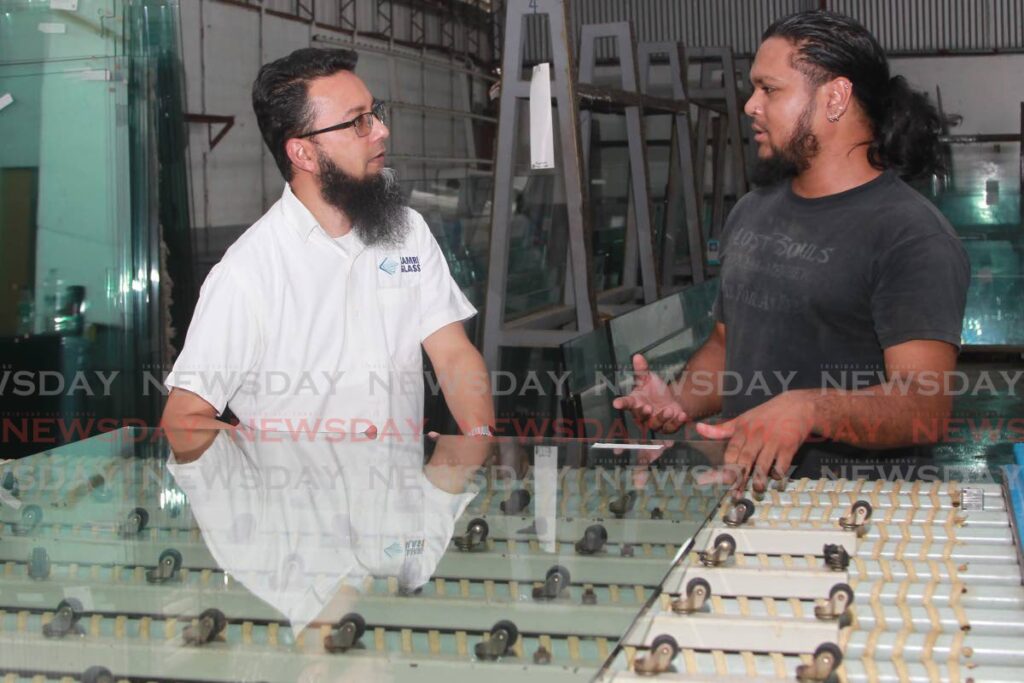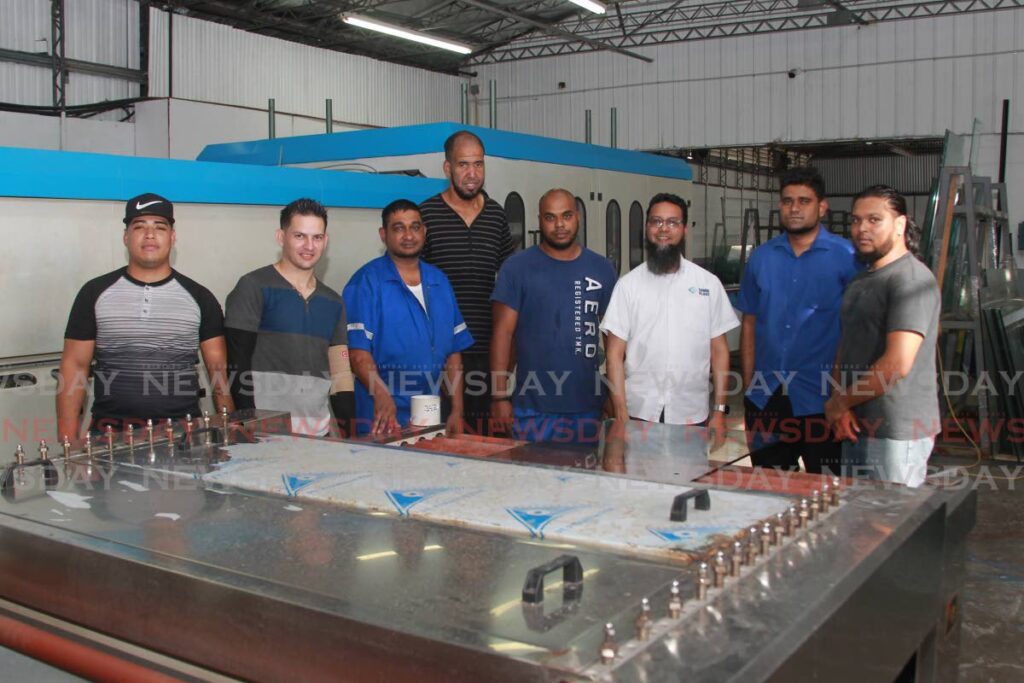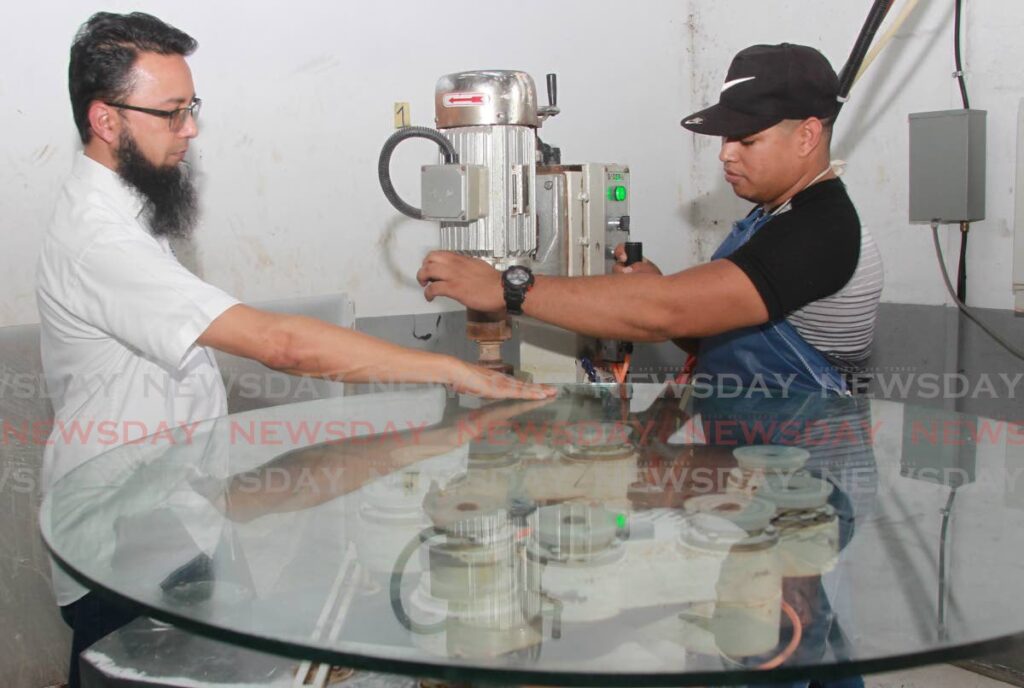Kamri founder: Family matters in business

Kameel Khan doesn’t run a business, he raises a family.
Starting off with only $600, Khan grew his business – Kamri Investments – from a distributor of various products to a glass distributor to an importer, and now to the point where it exports tempered glass to six countries and is expanding. It markets its products under Kamri Glass with a showroom in San Fernando and the factory at the Point Lisas Industrial Estate.
This year Khan was awarded the breakthrough exporter of the year at the TT Chamber of Industry and Commerce’s Champions of Business Awards in November. Khan told Business Day his family and his Muslim faith were the keys that not just made his business a success, but his family – his relatives, associates and employees who have toiled with him for years – a success as well.
Khan said he started his business in 2000, the year he married his wife, Rizwana. The name of the business was also a marriage of their two names.
“Kameel and Rizwana make up the name of the company. That is how we became Kamri,” he said. “That unity, together with God, is where everything came from.”
Khan said he and his wife built their business while working on starting a life together and studying. Khan studied at Costaatt, while Rizwana studied accounting.
Khan said even before they started their business they used their faith and their family as a means to keep them grounded.
“My father died six months before I got married, and I didn’t have any big inheritance to play with. There were times when we couldn’t put food on the table.
"When I got married, my wife and I wanted to do different things. I said, 'Let’s start to practise our religion better.' That gave us the room so that we would not have been going to try to live a lavish life – partying and all these things. It helped us focus.
“We were able to start building the business by becoming more focused on our marriage, religion and what we wanted to achieve.”
Khan started with distributing stretch wrap, which is used for sealing packages to pallets and in some cases for plumbing. Over the following six years they looked for a product to specialise in. He said at one time they began bringing in aluminium sheets for signs.
“We were looking for a little spot. Our products were making money, but we were looking for a niche. I realised that if I continued selling these smaller products, I would always be a young boy. I had to go out there and position myself.”
Khan realised he wanted to get into a market with high-value products such as glass, and started buying and reselling glass from local companies. But one year, he was unable to meet an order placed by a key customer coming out of a local bank, because the company he bought the glass from had closed down.
“I took the money from the people not knowing that they couldn’t finish the job. They didn’t tell me they would not be able to do it. I went to the place and the gates were closed. There was a sign that said, 'Sale in January.' I called the customer and she blew me out.”
Eventually that same customer became a part of their family.

“She saw the company brochure and asked another person who I was and how they ended up buying from them. She assumed that I was some rich kid that was wasting money.
"When that person told her, 'Stop, I actually know that boy. He doesn’t have a father or any rich kid thing going on with him,' and that she should listen to me, she called me in one day, and eventually she became my loans officer.”
It was through that same banking contact that Kamri was able to get its first loan. With that loan Khan was able to invest in educating himself about cutting glass and beginning to cut and distribute glass himself.
“We started very small,” he said. “We didn’t even know how to cut the glass, we didn’t have the experience, but we could spend and invest. So we hired people that knew to come and cut the glass and teach us. From there we started seeing import profits.”
Khan started supplying windows for housing projects, but was always thinking about the future. Through the advice of other businessmen he began thinking about technology to streamline his business, but it wasn’t until he went on a holy trip to Saudi Arabia that he got the inspiration to invest in machinery.
“We had to get a phone card while we were on the trip. So I left my mother at the hotel and went for the card, and while in the line, there was only one person who spoke English. We decided to exchange e-mails and I realised that we had been e-mailing back and forth about machinery and we didn’t even know it.
"I went to my mother and told her what happened and she said, ‘You know what that is, right? Destiny.'
“I asked her what about the money for the destiny, and she said if that meeting was destined to happen there, God would have already provided the means for it to come true.”
Although in the end Khan did not do business with the man he met on the pilgrimage, the meeting inspired him to go seeking out machinery for him to cut and polish high-quality glass for sale in domestic and international markets. The person he met on his pilgrimage dealt with equipment that ran on natural gas, and he did not have confidence in the supply at the time. So he went to different conferences and eventually met up with people who sold electric-powered machines.
Using money he had been going to use for another piece of equipment as collateral, he got approval for another loan. He then called in his family.
“I called my biggest brother, Warren, and said, 'Hey, I want to buy this equipment.' He was like. 'What? Do you know how much money that is?'
"Then I said that I needed to know if he had my back. He said, 'Now and forever.'”
They started buying technology. The main machine was a tempering machine that makes glass ten times stronger than safety-laminated glass. Khan said the machine takes stock glass and heats it to a certain temperature, then cools it, making it stronger and less likely to cut someone if it breaks. The strength of the glass and its safety features make it perfect for modern architecture.

However the machine was too fast for Khan and his employees to keep up with. The machine, Khan said, could do up to 100 sheets of glass per day, while he and his staff, who were still learning as they went along, could only do ten. They had to get the technology to support the machine and feed it glass so it could operate at its optimum. They bought drills and other equipment and even brought in TT’s first glass-cutting processing line. But they still encountered processing problems.
“We could cut the glass, we could polish the glass, but we couldn’t fabricate the glass fast enough to make the special cuts needed. The drills were just not doing the job fast enough. And after we do it and it isn’t done well, when it goes into the machine it breaks, and we are back to square one.”
They solved that problem by bringing in a waterjet cutter, which uses high-pressure water and sand to cut materials such as steel.
“That increased our product quality, our speed and of course our position in the market.”
Just before the shutdown in 2020 because of covid19, Kamri began exporting. Khan said the company was able to pay staff during the shutdowns, but without foreign exchange, it would not be able to continue exporting.
That was when his staff, some of whom had worked with him for up to 16 years, stepped in.
“One of them suggested that everyone take a desk and focus on a country. I said, 'If you want to do it then let’s do it.' We each decided to take a country and target five companies for each island. We guided each other on the best way to operate, since none of us knew about exporting. We sent e-mails, WhatsApp messages.
"Some responded, others didn’t, but the idea of what the staff did when we were closed really showed that the team was with us.
“When things opened back up I directly communicated with the prospects in the islands, and we took it to another level.”
Kamri now exports to Jamaica, Barbados, Grenada, St Lucia, St Vincent and Guyana. It is now expanding its business to Guyana with a subsidiary company. Exports grew to the point where the company did not need support from banks such as Eximbank for foreign exchange.
Khan said he used his success in his business to keep his family together, and used his family to help his business grow. He said the decision to integrate his family into his business started with marriage. While he did not know he would get into a business with this much success, he knew making the business part of the family unit would differentiate it from others.
“When everyone gets married, they move on a little bit or move away, but something brings them back, and you remember the good old days, and you remember the true connection of growing up. My main intention was to keep the family unit together.
"There are so many other businesses with wealth and dynamic operations that was not successful or fell. So I said, 'The one good thing we have as a family is that connection that we are all religious and believe in that one God.'”
The business also helped to keep the family together, he said, as it was sometimes one of the only excuses for them to meet, but eventually it brought them closer together, not just with relatives but with the staff as well.
Khan said he now makes room for his family with every expansion of his business.
“My uncle is involved in the business, my brother-in-law is involved in the business, my wife’s cousin is also in the business; and the staff, we know them as though they were family. We make sure that we create an environment for them to succeed.
"So we drew a circle, and as the business gets bigger we draw a bigger circle to bring in more family, and we use our religion to keep us rightly guided and to avoid dissatisfaction or to be guided incorrectly.”
He also said by taking money out of the equation when dealing with staff, and ensuring they are paid and invested in, staff have also begun treating the business as a family business.
“Once you take money out of the equation you can get to know the person,” he said. “You should want your staff to succeed, whether it is with you or through you as a stepping stone. With building staff to become family, you have to be understanding and you have to help them as well. We always tell our staff that we are going to get old and grey together. We will be talking about our grandkids.
“During covid19, they would call me and call my wife and ask how our kids were doing, and they would tell us about theirs. They would call us and say, 'Hey, we miss you.'
"When you have staff members saying things like that, they are not employees, they are family.”


Comments
"Kamri founder: Family matters in business"